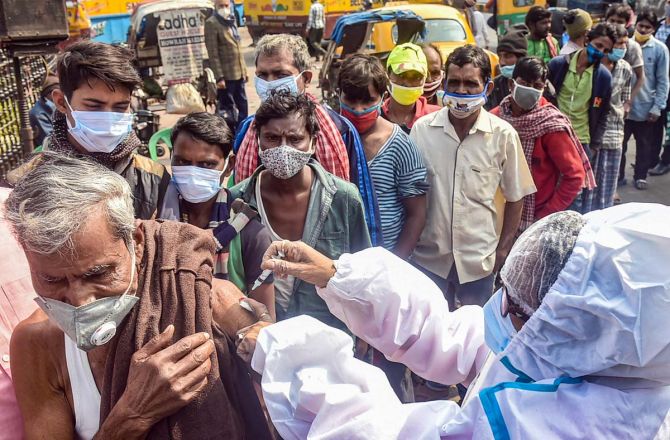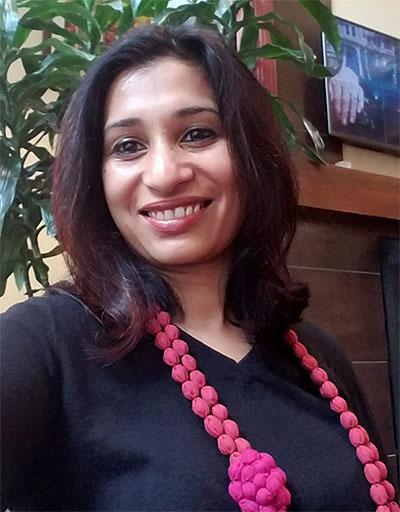'The pandemic ends only when 70 per cent of the world is vaccinated with two doses.'

Professor Bhramar Mukherjee's two-year study on how India is handling the COVID-19 contagion has seen her make four trips to India, one even prior to vaccination in November 2020.
These journeys have helped her gain a fuller epidemiological and public health picture of India and assisted in her modelling of the pandemic in our country.
She just returned to the US, after spending some of December and much of January in India.
Professor Mukherjee, chair of the University of Michigan biostatistics department, also professor of epidemiology and professor of global public health at the School of Public Health, also at UMich, offers in Part II of her interview to Vaihayasi Pande Daniel/Rediff.com sharp observations about the pandemic, the Omicron third wave and how India can cope.

In your opinion, are we coping with the Omicron-fuelled third wave in a much more appropriate manner?
The timing of instituting protective measures has been better this time, compared to the second wave
In the second wave we were too late in the game. By the time measures were being put in place, in April 2021, there was already a very high surge.
I feel this time people are more concerned and cautious.
But the memo of public health messaging has been wrong.
In India?
That's not particular to India.
All across the world it has been said that this Omicron is a mild thing and: 'I'm going to get through it. And after we all fall sick and get better, this whole pandemic ordeal, this whole nightmare is going to be over'.

There have been tweets like that as well...
Having this very confusing global public health messaging that says: 'It's okay to get Omicron and it's sort of almost like a blessing or nature's vaccine' has been a very wrong memo.
That's not the right message.
It basically (sends a message that) we don't need to test, we don't need to do anything. We just go through this and that ends the pandemic.
That's clearly not true. There is no scientific reason to believe so.
Even if Omicron is mild, having unrestrained spread and transmission, without any mitigation (stopping of the spread by limiting interaction), cannot be good. I think that has been confusing for the public, and also for policymakers.
We do not know that among all these millions of cases of Omicron happening, if there is a new variant brewing or not. Or if that variant is more lethal or not; whether that variant escapes the immune response or not. So, we do not know a lot of things.
This message that everybody can take risks and continue as normal was a wrong memo to begin with. We are seeing the chaos that can happen if even a lot of people are mildly sick.
Vaccination and mitigation -- both are needed -- to slow down the infections (resulting from the COVID-19 virus like Omicron). It will be needed until the whole world reaches a point where at least 70 per cent of the global population is vaccinated with two doses.
That's the blunt and blatant truth. You cannot really distort it in any other way. Till then, new variants, vaccine boosting, surges are going to continue until you are able to achieve that target.

Governments everywhere in India have been tightening protocols, giving out the message to be careful.
But since Omicron is mild, people seem more careless in protecting themselves in December 2021-January 2022 compared to December 2020-January 2021.
People are not listening to the public health messaging. They are bored; they are fed up; they just don't care.
In West Bengal, for example, right now gatherings are restricted. That's the right thing to do, because you are sort of in the middle of the storm at the moment.
I have heard about many super-spreader events in the United States that started from gatherings like weddings -- those are the places where you are indoors, you take your mask off, eat, sing, dance and laugh. Those are the most enjoyable areas, but the most high-transmission areas too.
As long as the pandemic is continuing, all of us cannot let our guards down at the same time.
We have to look at the individual's risk profile, and we have to look at the population risk profile.
If all of us say: 'Oh, I don't care about this', then, at the population level, there is the risk of so many people falling sick, and so many people going to the hospital.
A small fraction of people are always going to take risks. And just say, 'I don't care'. But if everybody's does that, then the society crumbles. I see that danger with Omicron, because of this wrong global messaging
Although, recently, it seems people have gotten more scared now -- particularly in Delhi I saw that the city was very still. Some of these curfews are probably sending out the message -- that it's very important for people to maintain the COVID-19 protocols.

It's the responsibility of the policymakers, the scientific community, the government to send the message that: We have to have a dial up-dial down way of life.
When the community risk level is low, we can continue with our life. As soon as we see an uptick of community level risk, we have to dial down. That's about us being a part of society and not just being individuals.
We also have tools now (to cope with the pandemic) and they have to be used in a pragmatic way. For example, in the United States it's very common that now before a large gathering that all of us do a home test to check whether we are infectious before going there.
In order to understand the Indian scenario, I was looking at the tests available. Some are being very overpriced, they are not available in some stores and online, there is a backlog.
If we have lots and lots of home tests available, flooding the market with them, then people could really check to see if they are infectious or not, before going to a gathering, before going to teach in a classroom or before going to see patients or boarding a plane.
For example, airlines are charging so much for their flight tickets -- if they invested even like Rs 100 in order to do a rapid test before people get on board, it will actually minimise a lot of the spread.
Similarly, weddings: If you're spending so much money on food, why don't you do a rapid antigen test before everybody gets into the hall?
These two years have been soul sucking. We need to get back to life.
 IMAGE: Dr Bhramar Mukherjee. Photograph: Kind courtesy Dr Bhramar Mukherjee
IMAGE: Dr Bhramar Mukherjee. Photograph: Kind courtesy Dr Bhramar MukherjeeAt the University of Michigan (where she works and teaches), even when the United States is registering 1 million cases, we are still continuing with in-person teaching. We have a 99 per cent vaccinated campus. We are requiring boosters for everyone from February to attend classes. We have a mask mandate: Nobody can enter buildings without proper masking.
We know that we don't have the life that we had before the pandemic and to aspire for that would be delusional. But we still need to have some of sense of life like what we had before. Now we have the tools to ensure that -- they are not so simple these tools -- but they make it safe before we get together.
For example, even with my parents -- I always do these tests. I am continuously going around meeting people and if I catch it, it might be mild for me and I can take the risk. But I cannot transmit that risk to my parents. So, I can constantly check.
These types of tools need to be used in India and really having good hygiene.
As I mentioned, on my domestic flight, there was a gentleman right sitting in front of me, who was blowing his nose and piling up a pile of tissues. These kinds of people should never be allowed to board a flight. I'm pretty sure even without Omicron or any kind of coronavirus, this would be inappropriate, because he is spreading his germs even if it's a common cold throughout the flight.
For me precautions have been masking all the time, rapid antigen tests, and, avoiding indoor gatherings with people that I don't know.
But then we have to also really get back to some of the basic fundamental things of life which give us joy, like in-person teaching. We are also fatigued by zoom classrooms where everybody turns on their cameras and do whatever.
It was a joy to get back to the classroom in a safe way, and be able to complete a semester without going remote.

What is sort of positive about the way India is handling the pandemic, when you contrast it to what is happening in the US?
Vaccine hesitancy is not prevalent in India. You can see it from the numbers -- 90 per cent of the eligible population has had one shot.
That's not true for the US. If you look at the data, 80 to 90 per cent of the people, who are on ventilators and who are in oxygen beds, are unvaccinated, all over the world. In the US that number is quite large.
It's wonderful that the adult population here is willing to listen to science and scientists and governments. That's really wonderful. We are not an authoritarian regime like China, but still people have social responsibility and norms and people are getting vaccinated.
The second thing is also that, at least locally, there are public health interventions that are being rolled out. That's the good thing about India.
The US never had a national lockdown. Things have been so polarised. Even from the very beginning US has not had a local or national-level lockdown and it's very heterogeneous across US states.
There is a good awareness and fear in India. Policymakers have unrolled interventions -- although not that well for the second wave, but definitely for this third wave.
Feature Presentation: Ashish Narsale/Rediff.com










